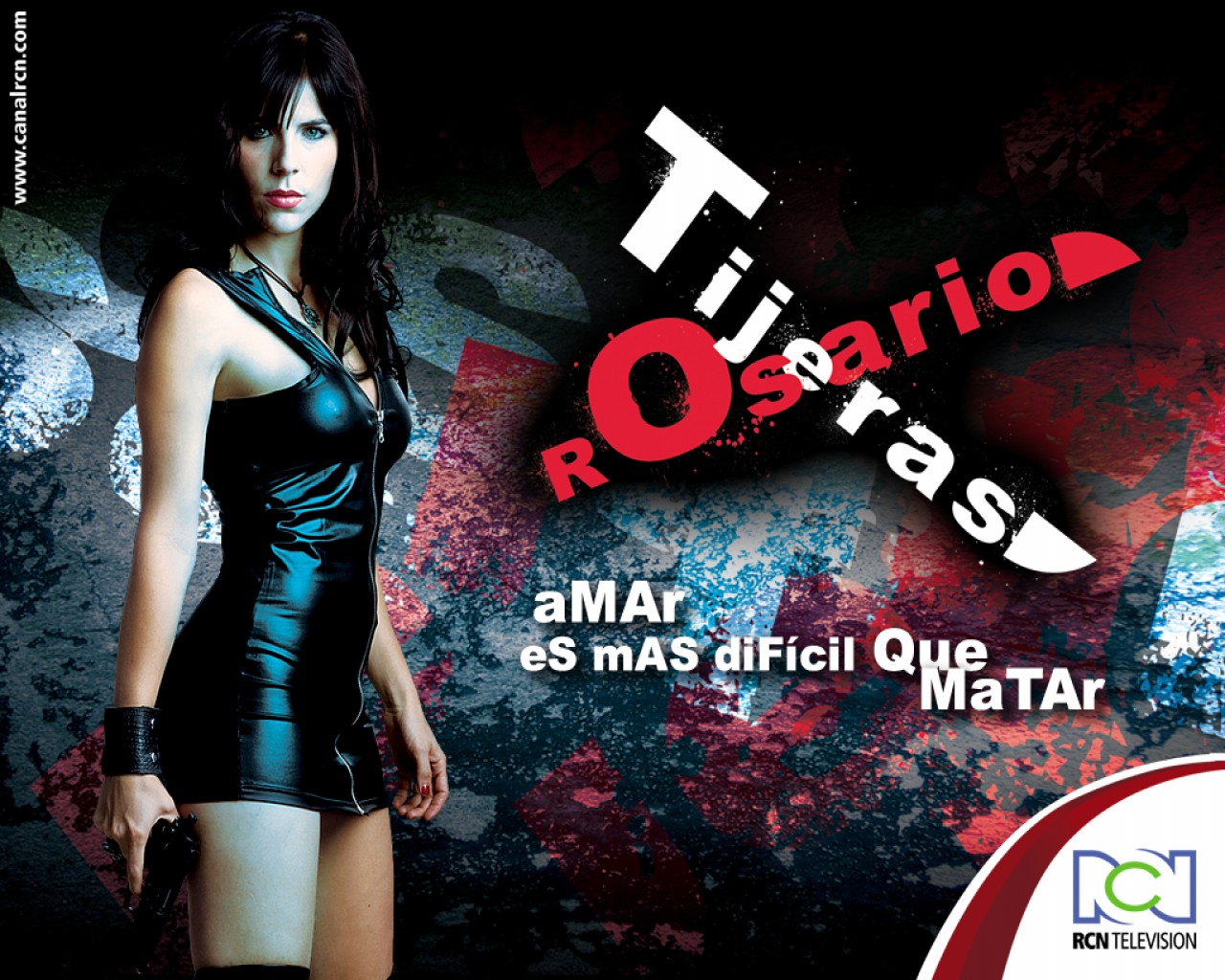★★★½
“Scissors cuts… well, just about everything.”
 As previously noted, one of the trademarks of the telenovela is the flashback, and the one we get here is a doozy. For, this begins with Rosario Tijeras (Yepez) being shot and rushed to hospital, prompting frantic phone-calls to her yuppie boyfriend, Emilio (Martinez). It then rewinds some five years, to show the events by which everyone got there, and takes roughly 45 episodes – three-quarters of the series! – to catch up and once more reach the point at which it began. Admittedly, this does reflects the structure of the source novel, and I don’t know if that’s why the final quarter feels like a marked improvement in terms of pacing and energy: the critically-injured Rosario is hunted in the hospital by those who want to finish the job, and has to be rescued by her brother Johnefe (Restrepo) and his crew – along with an unwilling doctor, to tend to Rosario in a workshop. From there, it’s an escalating series of death, betrayal, death, death, tragedy and death, with a body count that makes Hamlet look like Mary Poppins.
As previously noted, one of the trademarks of the telenovela is the flashback, and the one we get here is a doozy. For, this begins with Rosario Tijeras (Yepez) being shot and rushed to hospital, prompting frantic phone-calls to her yuppie boyfriend, Emilio (Martinez). It then rewinds some five years, to show the events by which everyone got there, and takes roughly 45 episodes – three-quarters of the series! – to catch up and once more reach the point at which it began. Admittedly, this does reflects the structure of the source novel, and I don’t know if that’s why the final quarter feels like a marked improvement in terms of pacing and energy: the critically-injured Rosario is hunted in the hospital by those who want to finish the job, and has to be rescued by her brother Johnefe (Restrepo) and his crew – along with an unwilling doctor, to tend to Rosario in a workshop. From there, it’s an escalating series of death, betrayal, death, death, tragedy and death, with a body count that makes Hamlet look like Mary Poppins.
This is, however, getting well ahead of ourselves, and you have to trudge through your fair share of soap-opera drama and “love across the class divide” to reach these excellent 15 final episodes. It begins with Rosario still a schoolgirl, albeit a rebellious one: an incident where she gives a teacher an unrequested hair-cut gets her and pal Dayra expelled, but also gets her the “Tijeras” (scissors) nickname, and wins the heart of Antonio de Bedout (Sandoval), a student visiting her school as part of a college project. He is the son of a rich businessman! She is the daughter of a poor but honest beautician! They keep just missing each other, even though her mom does house-calls on his sisters! But, wait! There’s more! His best-friend, Emilio (Martinez), gets to Rosario first, and they begin a torrid romance! But he’s already in a relationship with Paula, a girl from his social level! Okay, enough already. Although I think I probably used up the entire month’s quota of exclamation points there, they did not die in vain – you presumably get the picture.
 Fortunately, that’s not all that’s going on. After their expulsion, Dayra and Rosario work for the latter’s sleazy step-dad in the local market, selling cellphone minutes. Not cellphones. Cellphone minutes. They have a set of mobile phones chained to them, one for each carrier, and rent them out to whoever needs to call – I believe it’s the result of a market where calls between networks is extremely expensive, so if you want to speak to someone whose mobile uses a different carrier, it’s better to pay a small mark-up to a third-party. This demonstrates one of the confusing joys of watching foreign shows; the cultural differences, with things that seem strange to an outside, yet make perfect sense as part of the cultural norm, to locals.
Fortunately, that’s not all that’s going on. After their expulsion, Dayra and Rosario work for the latter’s sleazy step-dad in the local market, selling cellphone minutes. Not cellphones. Cellphone minutes. They have a set of mobile phones chained to them, one for each carrier, and rent them out to whoever needs to call – I believe it’s the result of a market where calls between networks is extremely expensive, so if you want to speak to someone whose mobile uses a different carrier, it’s better to pay a small mark-up to a third-party. This demonstrates one of the confusing joys of watching foreign shows; the cultural differences, with things that seem strange to an outside, yet make perfect sense as part of the cultural norm, to locals.
I digress – but given a show telling a single story over 60 episodes, so does the series, so we’re even. Anyway, the girls’ job brings them into contact with their stepfather’s boss, Gonzalo González, whose even sleazier, and has a “thing” for young virgins. Hoping to make her way out of the slums, Dayra sashays into Gonzalo’s ranch, but when he discovers she is not quite as pure as advertised, his revenge is swift and brutal, and her lifeless body is found on a patch of wasteland. Meanwhile, Rosario is having issues of her own, culminating in her abduction and rape at the hands of a local gang led by Cachi. She takes revenge there first, castrating him, and then goes after Gonzalo – although the plan is for Johnefe to help her, she ends up entirely on her own resources, but doesn’t flinch, and he becomes her first victim. Gonzalo’s drug-running rival, Adonai, known as “The King of Heaven” is delighted by her actions, and the first phase of the show ends with her becoming part of his organization.
We then fast forward a few years. Emilio and Antonio encounter Rosario again, in a nightclub, and begin their dalliance anew, unaware that she was there on a job for the King, and is now a feared and notorious assassin for him. The love triangle is more of a love quadrilateral, thanks to barrio boy Ferney, and it’s this which provides the key to the Shakespearean events of the second half. Rosario discovers evidence that the king’s brother, Teo, is deceiving him, having swapped out two tons of cocaine for sugar, blown up the plane on which the cargo was being transported, then sold the real thing off to another buyer. Teo realizes Rosario must be silenced, and convinces Ferney that he has no chance with her, when put beside the rich yuppies, and that she’s going to betray her roots for a future as part of the upper classes to which the pair belong. And that’s how we eventually end up, 45 episodes later, back where we started, with Rosario being rushed to hospital.
The early going is certainly more soap-opera than anything else, it still makes for adequate entertainment, with the good characters appropriately likeable, and the bad ones suitable evil. That said… Damn, the guys in this show appear to be almost entirely driven by their genitalia. In particular, Emilio has absolutely no issue with bedding Rosario, even as he is going out with, then engaged to, and even married to Paula Restrepo, an aspiring model. She shows rather more tolerance for his roaming than I would, and I can’t really blame her for eventually taking steps to remove Rosario from her married life. But Emilio is hardly alone: there’s an entire subplot involving Antonio’s father, Luis Enrique, who has been having a long-time affair with his secretary, including a secret daughter, which may explain his wife’s heavy drinking. Not sure how much of this is in the book, and how much is additional padding: I suspect the latter, since when you’ve got 60 episodes to fill, you’re likely going to need more material than a single novel. Some aspects does appear directly derived, however – or, at least, were also in the film version, made five years previously.
 One such is the funeral of one character: it appears such events, at least in the Medellin slums, are rather less… formal than we’re used to. By which, I mean the corpse is paraded about on a sun-lounger, to loud reggaton, then placed on the back of a motorcycle which pulls wheelies around the neighbourhood. Like I said: these kind of cultural differences, can only be accepted for what they are. Though it might have helped if Netflix had the same person subtitle all the episodes, as there are sometimes confusing inconsistencies. It took me a while to figure out that characters called “Querubin” and “Mago” were the same ones called “Cherub” and “the Magician” elsewhere, depending on whether the subtitler bothered to translate their names. Even more confusing, Netflix managed to list one episode entirely out of order. When watched in the order provided, this led to Luis Enrique’s affair-daughter suddenly being held to ransom, for no apparent reason, then being released, and only finally, getting kidnapped – at which point, it all made sense, rather than being some particularly obscurist structure involving nested flashbacks.
One such is the funeral of one character: it appears such events, at least in the Medellin slums, are rather less… formal than we’re used to. By which, I mean the corpse is paraded about on a sun-lounger, to loud reggaton, then placed on the back of a motorcycle which pulls wheelies around the neighbourhood. Like I said: these kind of cultural differences, can only be accepted for what they are. Though it might have helped if Netflix had the same person subtitle all the episodes, as there are sometimes confusing inconsistencies. It took me a while to figure out that characters called “Querubin” and “Mago” were the same ones called “Cherub” and “the Magician” elsewhere, depending on whether the subtitler bothered to translate their names. Even more confusing, Netflix managed to list one episode entirely out of order. When watched in the order provided, this led to Luis Enrique’s affair-daughter suddenly being held to ransom, for no apparent reason, then being released, and only finally, getting kidnapped – at which point, it all made sense, rather than being some particularly obscurist structure involving nested flashbacks.
One aspect worthy of note is that the police aren’t shown here as being particularly corrupt or bad, in contrast to some I’ve seen where they are the “bad guys”. Detective Pamela Pulido, played by Jenny Vargas Sepulveda, is both honest and smart, and gets a fair amount of screen-time as she tries to disentangle the increasing mess with her partnet, Isaak – in particular, by turning up the heat on Emilio and Antonio. [During filming, there was an odd incident where Sepulveda was arrested and held for five hours, at the airport on the way to Medellin, after her luggage was inexplicably found to contain a number of live rounds of ammunition!] Rosario’s second step-father, Libardo, is also a member of the police force, though his morality turns out to be considerably more murky, even if some of his actions largely appear to be driven by concern for the welfare of his step-daughter.
I’d have liked to see more from the period over which the show entirely skips, showing Rosario’s rise to the top of the King’s accomplices, rather than the various subplots involving the business and property dealings of the de Bedout family. The show is called Rosario Tijeras after all, and should be about the heroine and her lethal exploits, not country-club memberships and tennis matches. Still, even during the lengthy periods where it focuses more on the drama than action, the cultural freshness and generally engaging nature of the people depicted, kept this ticking over. Rosario herself makes for a very good and strong heroine, who takes absolutely no shit from anyone, and when life gives her lemons, she makes lemonade – albeit, one imagines, only after repeatedly stabbing the lemons with a pair of scissors.
Star: Maria Fernanda Yepez, Andres Sandoval, Sebastián Martínez, Juan David Restrepo



















